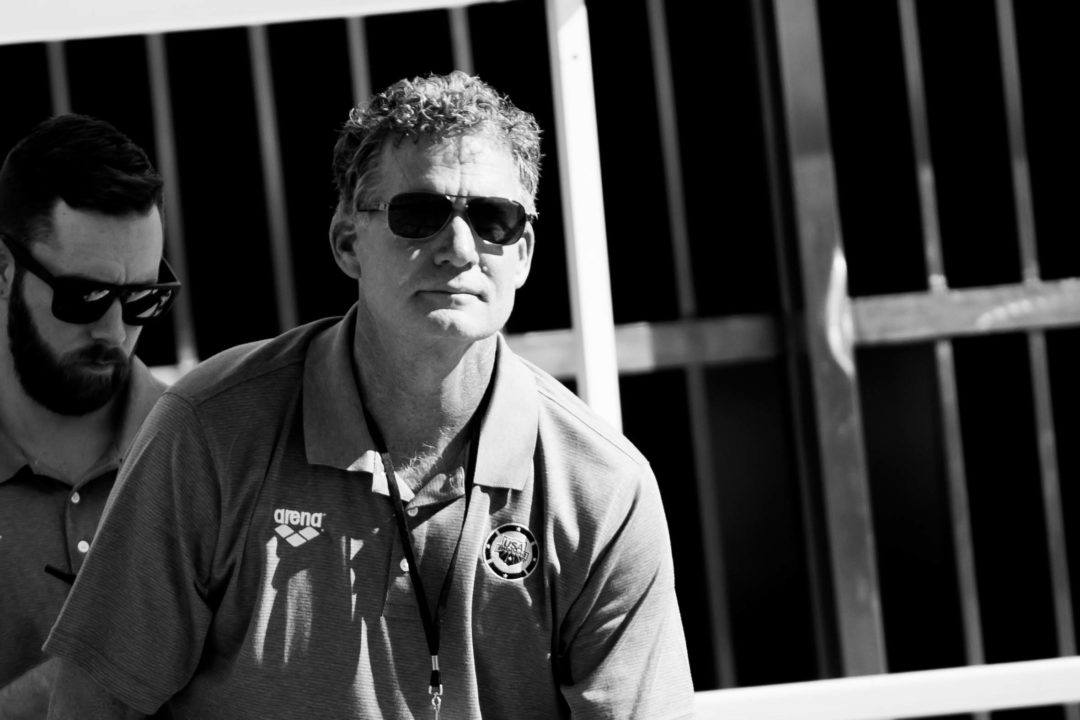UCSD head coach David Marsh shared a tidbit of knowledge with SwimSwam, giving his swimmers a keen insight into what makes a fast and efficient open turn.
UCSD David Marsh Bio, courtesy of UCSD:
David Marsh, a top-level coach of elite swimmers for over 30 years who guided the 2016 U.S. Women’s Olympic Team to 16 medals, was named the new head coach of the University of California San Diego men’s and women’s swimming and diving programs on June 27, 2017.
Marsh heads cross country to La Jolla from Charlotte, N.C., where he spent the past 10 years as the CEO and Director of Coaching of SwimMAC Carolina. Within that structure, Marsh established and coached Team Elite, which includes SwimMAC’s impressive list of professional swimmers. SwimMAC generated 14 Olympians for the 2008, 2012 and 2016 Games during Marsh’s tenure, with that group compiling 11 gold, two silver and one bronze medal. All told, 38 USA Swimming national champions and 27 junior national champions came from SwimMAC the last decade.
Marsh led the women of Team USA to unprecedented success at the 2016 Rio Olympics, with a final medal haul of eight gold, four silver and four bronze. That contingent featured the likes of Katie Ledecky, Simone Manuel, Maya DiRado and Lilly King. Team Elite placed more U.S. Olympians than any program in the country, six, with Kathleen Baker, co-captain Anthony Ervin, Jimmy Feigen, Ryan Lochte and Katie Meili all earning gold medals.
During the summer of 2017, Marsh was in Indianapolis, Ind., for the Phillips 66 National Championships, aiding four of his Team Elite swimmers onto Team USA for the 17th FINA World Championships, for which he was in Budapest, Hungary, in late July as a technical advisor for Team Israel.
Prior to his time in Charlotte, Marsh was the head coach of the men’s and women’s swimming and diving teams at Auburn University from 1990-2007. He led the Tiger men to seven national titles, including five straight from 2003-07, and the women to five. Those five all came within a six-year span between 2002-07, with a runner-up showing in 2005. The men were also national runners-up three times under Marsh.
Additionally, Marsh’s Auburn Tigers combined for 17 Southeastern Conference (SEC) crowns, highlighted by 11 consecutive men’s championships from 1997-2007. He was a nine-time national and 13-time SEC Coach of the Year. Marsh coached countless All-Americans, 10 Academic All-Americans, and 49 Olympic athletes from 19 different countries.
For USA Swimming prior to 2016, Marsh was an assistant coach on the 2000, 2008 and 2012 Olympic staffs, and involved in numerous other competitions around the globe. He was named USA Swimming’s developmental Coach of the Year in 2013 and 2014 for his work with SwimMAC.
Marsh swam at Auburn from 1978-81 and graduated in 1981 with a bachelor’s degree in business administration. His wife, Kristin, swam at California and is also an accomplished sports educator, most recently as head coach at Pine Lake Preparatory. Of their three children, Aaron is a junior track and field distance runner at Charlotte’s Queens University, Alyssa a sophomore swim team captain at Duke, and Maddie a high school senior. Alyssa placed fourth in the 50-meter butterfly at the 2017 Phillips 66 National Championships.

I swam a few times at a vintage pool whose gutters were too high compared to the water level to grab onto. If you didn’t come into the wall fast on the breaststroke and fly, then you’d have little momentum for the turn and end up just drifting away from the wall. If you have to grab onto the gutter to turn, then you’re coming into the wall too slow. At least this pool was 25 yards.
I like his statement that the arms need to be straight coming in. If the trailing arm is straight you can take advantage of the momentum you have coming into the wall to spin. If you bend and use your arms as shock absorbers, you then have to generate spinning force independent of your speed. The rich get richer — the faster you swim the more potential you have to spin faster IF you don’t glide in or absorb the shock. Good lesson — thanks David. Great seeing you last week at CBU. Hope to see you again soon. They don’t take me to Nationals, but hopefully you’ll see some of my influence. I can already see your great influence… Read more »